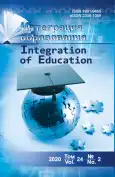Analysis of the effect of school organizational culture and professional learning communities on teacher efficacy
- Authors: Lee S.Y.1
-
Affiliations:
- Namseoul University
- Issue: Vol 24, No 2 (2020)
- Pages: 206-217
- Section: International Experience in the Integration of Education
- Submitted: 31.05.2025
- Published: 15.03.2020
- URL: https://journal-vniispk.ru/1991-9468/article/view/294512
- DOI: https://doi.org/10.15507/1991-9468.099.024.202002.206-217
- ID: 294512
Cite item
Full Text
Abstract
Introduction. The aim of the study is to fi ways to expand teacher effi by examining how the teacher’s efficacy varies according to the school organisation culture and the level of the professional learning community.
Materials and Methods. Survey methods were used to collect the data from 400 in-service teachers at elementary, middle, and high schools in South Korea, with five schools selected from each region, respectively. This study utilizes the data from 359 teachers. This study used a random sampling method, taking the location of the school into consideration. Descriptive statistics were used to examine the overall trends in school organisation culture. T-test was used to examine differences among research variables depending on the personal background of gender and teacher level, and the F-test and Scheffe tests were used for school level and teaching experience.
Results. First, school’s organization culture is transforming and evolving into a more ideal and model culture. As schools increasingly transform into innovative schools, innovative cultures and group cultures gradually form. Second, a school is a type of organization system that elicits responses elicits a variety of responses from the teachers depending on their personal background and characteristics. Third, professional learning communities have a positive effect on teacher efficacy. Therefore, school organisation culture can be seen as a better predictor of teacher efficacy than a professional learning community.
Discussion and Conclusion. The article is of interest to the managers of the school education system.
About the authors
S. Y. Lee
Namseoul University
Author for correspondence.
Email: edupro@hanmail.net
ORCID iD: 0000-0001-5233-7690
Scopus Author ID: 56496385000
ResearcherId: AAJ-2994-2020
Professor of the Department of General Education
Korea, Democratic People's Republic of, Cheonan-siReferences
- Koh K.H. [A Study on the Relationship between Principal’s Servant Leadership, Teacher Efficacy, School Organizational Commitment, and School Organizational Effectiveness. Doctoral Dissertation]. Incheon: Inha University Graduate School; 2011. (In Kor.)
- Heo J., Choi S.J., Kim L.K., Kim K.S., Kim Y.R. [International Comparison of Teachers and Teaching Environments: Based on TALIS 2-cycle Results]. Jincheon: Korea Educational Development Institute; 2015. (In Kor.)
- Lee D.Y., Heo J., Choi W.S., Lee H.H., Kim H.J., Ham S.H., et al. [Why is Korean Teachers’ SelfEfficacy Low?: Based on TALIS 2-cycle Results]. Issue Paper, IP 2018-03. Jincheon; Korea Educational Development Institute; 2019. (In Kor.)
- Ross J., Bruce C. Professional Development Effects on Teacher Efficacy: Results of Randomized Field Trial. The Journal of Educational Research. 2007; 101(1):50-60. (In Eng.) DOI: https://doi.org/10.3200/ JOER.101.1.50-60
- Eaker R., DuFour R., Burnette R.J. Getting Started-Reculturing Schools to Practice. Massachusetts: Addison Wesley; 2002. (In Eng.)
- Lee S.Y. [Development and Application of Teachers’ Community Learning Scale]. Korean Journal of Educational Administration. 2018; 36(2):201-227. (In Kor.)
- Sarason S. Revisiting the Culture of the School and the Problem of Change. New York: Teachers College Press; 1996. (In Eng.)
- Owens R.G., Valesky T.C. Organizational Behavior in Education: Leadership and School Reform. 10th еd. Pearson; 2012. Available at: https://www.pearson.com/us/higher-education/program/Owens-Organizational-Behavior-in-Education-Leadership-and-School-Reform-10th-Edition/PGM162063.html (accessed 20.11.2019). (In Eng.)
- Park S.C. [Usefulness and Limitations of School Culture Concepts in Educational Administration]. Korean Journal of Educational Administration. 2006; 24(4):91-112. (In Kor.)
- Lee S.Y. [Relationship between School Organizational Culture, Principal’s Instructional Leadership, and Teacher’s Professional Capacity. Doctoral Dissertation]. Daejeon: Chungnam National University; 1997. (In Kor.)
- Song K.O., Choi J.Y. [Measurement Model and Level Analysis of Teacher Learning Community in Elementary and Secondary Schools]. Korean Journal of Teacher Education Research. 2010; 27(1):179-201. (In Kor.)
- Kwon N. [Explore the Possibility of Building a Professional Learning Community]. Learner-Centered Curriculum Research. 2007; 7(2):1-27. (In Kor.)
- Argyris C., Schon D. Organizational Learning II: Theory, Method and Practice. National Educational Service; 1996. (In Eng.)
- Senge P.M, Cambron-McCabe N., Lucas T., Smith B., Dutton J., Kleiner A. Schools that Learn. New York: Doubleday; 2000. (In Eng.)
- Lee S.Y. [Teacher’ Team Learning Activity Analysis and Learning Organization Relationships]. Korean Journal of Educational Administration. 2007; 25(4):95-115. (In Kor.)
- DuFour R., DuFour R., Eaker R., Many T. Learning by Doing. A Handbook for Professional Learning Communities at Work. Bloomington, IN: Solution Tree Press; 2010. (In Eng.)
- Brouwers A., Tomic W. A Longitudinal Study of Teacher Burnout and Perceived Self-Efficacy in Classroom Management. Teaching and Teacher Education. 2000; 16(2):239-253. (In Eng.) DOI: https://doi. org/10.1016/S0742-051X(99)00057-8
- Quinn R.E., McGrath M.R. The Transformation of Organizational Cultures: A Competing Values Perspective. In: Frost P. et al. (ed.) Organizational Culture. Beverly Hills, Ca: Sage; 1985. (In Eng.)
- Choi D.K. [Structural Relationship between Creative Leadership, Teacher Core Competency, Teacher Efficacy, and School Organizational Effectiveness. Doctoral Dissertation]. Busan: Pukyong National University; 2018. (In Kor.)
Supplementary files










